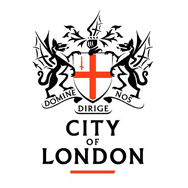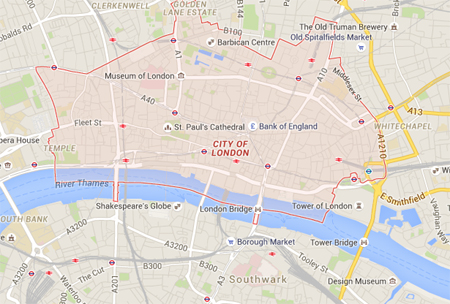The City of London, widely referred to simply as ‘the City’, or ‘the Square Mile’ is both a city and Borough within London. The City is now only a very small geographical part of the metropolis that is Greater London, though it is still considered by some to be the financial capital of the world due to its high concentration of financial service sector organisations, and its economic output across a wider range of industries.
The Borough of the City of London is headed by the Lord Mayor of the City of London, Lord Mountevans. The Borough encourages and supports business and enterprise in all sectors, and a gateway to some of this support can be found of the City of London Borough website

In terms of culture and creative industry education, the City is the UK capital – City University London is home to the Centre for Culture and the Creative Industries which provides a rich and thriving academic environment in which to study the CCI sector. Their world-leading research informs organisations such as UNESCO and the Department of Culture, Media and Sport on all matters of cultural policy.
They deliver an MA in Culture, Policy and Management – the longest established programme of its kind in the United Kingdom, being established nearly 40 years.
Their MPhil/PhD in Culture and Creative Industries provides students with the chance to develop their research agenda working with experts in cultural policy and creative industries around the world.
The school also delivers an undergraduate BA in Cultural and Creative Industries – the first of its kind in the UK, and already has formed the basis of a number of international partnerships including one with the Shanghai Theatre Academy.
The institution has been key to fuelling the CCI market’s increasing contribution to the overall economy of the City.
Aside from the direct contribution to the economic output in the City, a report by the City of London Corporation, prepared by BOP Consulting in 2014, estimated that the organisations within the City’s CCI sectors generated an indirect economic impact of £20.4 million in the City of London, in terms of GVA.
Additionally, they also estimated the knock-on economic effect generated by the expenditures of creative people working in the organisations positioned in CCI sectors in the City. In terms of GVA, in the financial year to 2014, it was found that the income effect generated by the cluster was £53 million for the City.
One of the main benefits accrued by firms when locating in clusters is the opportunity of taking advantage of a shorter, more tightly-linked supply chain. Co-working spaces are both the precursor and result of this cluster-effect and allow users to make this supply chain more efficient.
As the demand for co-working options has increased in recent years, by many industries, it is, perhaps, not surprising that many of the operators have chosen the City in which to place themselves. Some examples of popular spaces include; Co-Work.co on Queen Street EC4, and Central Working at Crown Place EC2.

In terms of workspace for general start-ups, there are many options. There are those spaces that would fall into the category of entrepreneurial ‘hubs’ ,‘incubators’ or ‘accelerators’ – these provide space, but also provide access to mentorship and potential funding. Whilst these are not solely dedicated to creative and cultural industries, they could certainly be used by those within them, especially if they felt they could benefit from the additional services.

A popular space for start-ups for a wide range of industries is Campus which is run by Google for Entrepreneurs. This is located on Bonhill Street, EC2 and, as well as providing co-working space and event space, it also provides the accelerator space, Seedcamp – this, they describe, is a space in which founders can gain access to first-round finance. More details on Google Entrepreneurs can be found on the official website here.
There are many flexible office space options across the City that offer serviced office space, managed offices, co-working options, as well as, meeting room and virtual office services, these can be found in the EC1, EC2, EC3, and EC4 postcodes.
We have added some useful resources below:
Office Space In the EC1 area of London
Office Space In EC2 area of London
Office Space In EC3 area of London
Office Space In EC4 area of London
There are also workspace solutions in the historic area of Farringdon as well, more can be found on The Office Providers – Serviced Office Space In Farringdon website page.
This will study will continue to research the direct and indirect economic impact of the creative industries in the City of London – it will also focus on the effect of co-working spaces and other flexible workspaces in creating a more tightly-linked supply chain.
